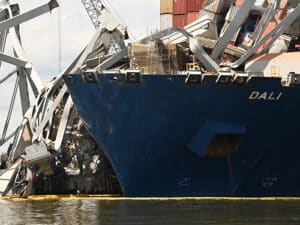
Outrage grows over Prestige master prison sentence
Written by Nick Blenkey
FEBRUARY 1, 2016 —The Spanish Supreme Court’s decision to sentence Captain Mangouras to two years imprisonment over the 2002 Prestige oil spill is meeting with growing industry condemnation.
ITF seafarers section chair Dave Heindel called the decison “the dying gasps of a 14 year old attempt to deflect blame onto the shoulders of an octogenarian man, who has been cleared in the court of world opinion and by his peers.”
Intertanko noted that the Supreme Court had overturned the 2013 verdict of the Spanish court of first instance in La Coruna which had acquitted Captain Mangouras of charges of criminal damage to the environment.
“In an unorthodox revision of the factual findings of the lower court,” says an Intertanko statement “the appeal court has now ruled that Capt Mangouras and the owner of the Prestige acted ‘recklessly’ in 2002 when the 81,000 dwt tanker and its 50,000 tonne fuel oil cargo were lost off Spain’s west coast.
“The 2013 judgement found Capt Mangouras criminally responsible solely for serious disobedience to the Spanish authorities during the incident for his initial refusal to allow the Prestige to be taken under tow, but judged that this offense had not contributed to environmental damage. Capt Mangouras was sentenced to nine months in prison. As this alleged ‘disobedience’ was not causative of the damage, the court was not able to award compensation to the Spanish authorities.
“The Supreme Court judges now find Capt Mangouras guilty of gross negligence for his decisions during the voyage and his actions as events evolved. His conduct is now said to have caused catastrophic environmental damage. The Supreme Court’s deviation from the findings of the La Coruna court is not only radical but also flies in the face of the courageous example Capt Mangouras set in responding to the emergency.
“Capt Mangouras, now 81 years old, is outrageously branded a ‘reckless’ criminal. Yet his actions were described as ‘exemplary’ by the vessel’s flag state. Confronted with a refusal by the Spanish authorities to give the damaged ship refuge, Capt Mangouras bravely did all he possibly could to protect crew, ship and cargo and to protect the environment. He remained on board with the Chief Engineer after the rest of the crew had been evacuated, in order to try and save the ship. Finally, against his judgement, he was obliged by the Spanish authorities to take a series of actions that resulted in the damaged tanker being forced to remain out at sea in appalling conditions, where she eventually broke up.
“The Supreme Court notably reinforced the lower court’s acquittal of José Luis López Sors, the former head of Spain’s merchant marine department, who ordered the Prestige to be towed out to sea instead of to a place of refuge where an oil spill could have been contained. In refusing appeals against his acquittal the Spanish state absolves itself from any responsibility for the disaster.
“The 2016 ‘policy’ decision hands a civil liability victory to Spain’s government. The judges, headed by Magistrate Ana Ferrer, dismissed liability limitations because they found that the vessel’s Master and the Owner had both acted recklessly. This leaves the P & I insurers potentially facing a claim of up to US$ 1 billion. It is not clear whether the Spanish authorities will seek to recover from other parts of the industry, including the International Oil Pollution Compensation Funds (IOPC) where the overall limit of compensation is some Euro 171.5 million.
“Ironically we this week saw the launch of Europe’s new guidelines on places of refuge (PoR), developed jointly with the shipping industry and with the specific aim of resolving the issues surrounding the granting of a PoR. The proper implementation of these guidelines is intended to avoid repeating mistakes made during the Prestige and MSC Flaminia incidents. The guidelines were drafted to ensure better coordination and exchange of information amongst competent authorities and industry stakeholders involved in the response to an incident concerning a ship in need of assistance. Capt Mangouras would be living a very different life had such guidelines been followed in 2002.
“Intertanko considers the findings of Spain’s Supreme Court, the new conviction and harsh sentencing of Capt Mangouras as deplorable, unjustifiable and fundamentally wrong. ‘This sets a deplorable precedent,’ says Intertanko’s Managing Director Katharina Stanzel. ‘Are ships’ masters who exercise best professional judgement in impossible circumstances to be shamefully treated as criminals?’ “





Leave a Reply
You must be logged in to post a comment.